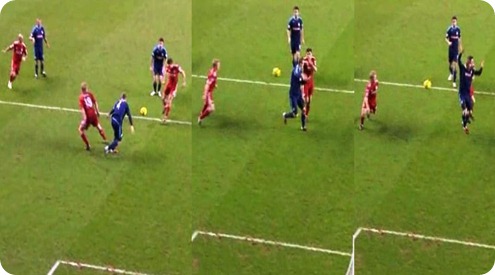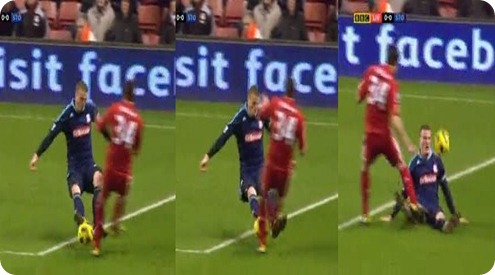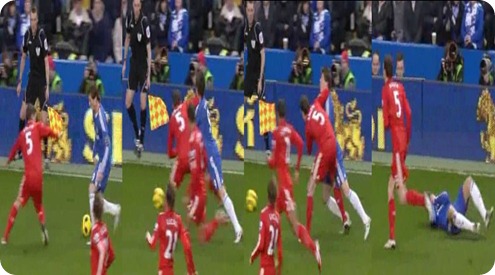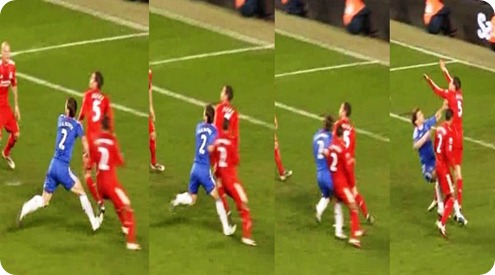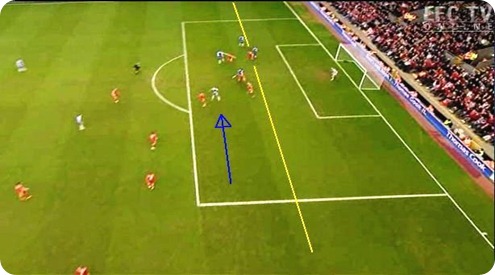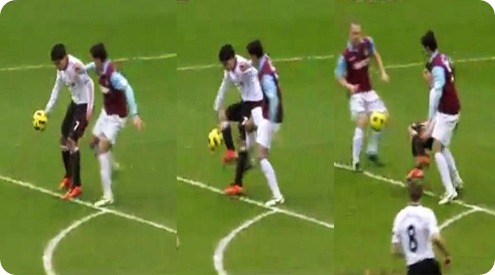Simon Fear – pro-qualified referee and Tomkins Times member – takes an uncompromising and unbiased look at the officiating in games involving Liverpool in February 2011. Was luck for or against the Reds?
Note: Usually for Subscribers only, this month’s piece is free to all.
Liverpool faced matches against Stoke (H), Chelsea (A), Wigan (H) and West Ham (A) in February and were looking to build upon the recent improvement since the appointment of Kenny Dalglish.
Stoke (H) – Anthony Taylor.
Liverpool’s home match against Stoke was a chance to avenge their defeat at the Britannia Stadium earlier in the season, in one of the most physically aggressive matches seen in the Premier League. Having been promoted to the elite list in November 2010, Anthony Taylor was refereeing his first match at Anfield.
In the 18th minute, Steven Gerrard pleaded for a penalty after exchanging passes with Meireles in the penalty area. Gerrard knocked the ball past Huth who quite intentionally stepped across and into the path of the Liverpool captain, making no attempt to nor having any opportunity of playing the ball. Huth was clearly guilty under Law 12 of ‘Impeding the progress of an opponent’. A player is guilty of impeding an opponent if he moves into the path of the opponent to obstruct, block, slow down or force a change of direction by an opponent when the ball is not within playing distance of the player. Gerrard was right to expect Mr Taylor to penalise Huth, however this offence is punishable only by an indirect free-kick, not a penalty kick.
Stoke, although missing one of their usual enforcers, the suspended Ryan Shawcross, still had Robert Huth continuing to play the role. His next transgression was a dreadful challenge on Martin Kelly. Kuyt collected a pass from Gerrard which he touched back to Kelly, Huth challenged for the ball with a tackle that involved him jumping with both feet off the ground and landing with both sets of studs showing. To make matters worse, Huth made contact with Kelly whilst still airborne. The tackle was clearly visible to Mr Taylor and his assistant. Huth was guilty of serious foul play and should have seen a red card.
“A player is guilty of serious foul play if he uses excessive force or brutality against an opponent when challenging for the ball when it is in play.” A tackle that endangers the safety of an opponent must be sanctioned as serious foul play. “Any player who lunges at an opponent in challenging for the ball from the front, from the side or from behind using one or both legs, with excessive force and endangering the safety of an opponent is guilty of serious foul play”. Again this serves only to highlight the lack of consistency amongst referees, and gives players the message that dangerous tackles are permissible.
Stoke were penalised again in the 46th minute when Salif Diao was pulled up for an agricultural challenge on Daniel Agger as the Danish defender strode towards the Stoke penalty area. Diao made a wild swipe from the side, making absolutely no contact with the ball and taking Agger knee high. Diao was correctly cautioned, and from the resulting free-kick Liverpool opened the scoring.
John Carew had committed two fouls in quick succession before finally being cautioned in the 49th minute for unsporting behaviour (Under Law 12 – Persistent infringement of the Laws of the Game) after fouling Daniel Agger. Carew then committed another foul and proceeded to show clear dissent to Mr Taylor after being penalised by throwing the ball away. However Mr Taylor failed to deal with the dissent, which should have led to a second caution and dismissal.
Stoke finished the game with four yellow cards. The fourth came in the 80th minute when Danny Collins decided to introduce Luis Suárez to the Premier League with a blatant foul from behind. The ball was played to Suárez on the halfway line by Meireles, Suárez played the ball instantly and as he turned to run forward he was fouled by a late and dangerous tackle from Collins. The foul was utterly deliberate and was rightly punished by Mr Taylor with a caution for unsporting behaviour.
Overall Mr Taylor had a poor game; he allowed Stoke far too much leniency over a number of deliberate late and dangerous tackles. He also allowed Carew to clearly show dissent towards him. Mr Taylor should have issued two red cards to Stoke players (Huth and Carew for a second yellow card) yet he seemed unable to make the big decisions.
Chelsea (A) – Andre Marriner.
Liverpool faced Chelsea at Stamford Bridge after the close of the January transfer window and the loss of Fernando Torres. Liverpool again opted for three central defenders, who were matched against Drogba, Anelka and Torres. Mr Marriner was quickly into the action after just 32 seconds when he rightly cautioned Mikel for a late lunging challenge on Steven Gerrard. Whilst this was the first significant challenge of the match, Mikel was late, had no opportunity of winning the ball and the tackle itself was reckless with Mikel’s studs connecting with Gerrard’s right shin.
The first big decision came in the 25th minute, when Torres was fouled by Daniel Agger on Liverpool’s left side. Torres slowed Agger before knocking the ball past him. As Torres started to accelerate past Agger, the Liverpool defender stepped into Torres and raised his right forearm and blocked Torres across the neck, under his chin. Torres collapsed to the floor and Agger, who made absolutely no attempt to play the ball, was penalised by Mr Marriner.
Mr Marriner had a number of options; the lenient choice would have been to caution Agger for ‘Unsporting Behaviour’, and the more serious option would have been to dismiss Agger for ‘Violent Conduct’ or ‘Serious Foul Play’. A caution for unsporting behaviour would be because Agger’s challenge was ‘Reckless and made with Excessive Force.’ “Reckless” means that the player has acted with complete disregard to the danger to, or consequences for, his opponent, and “Using excessive force” means that the player has far exceeded the necessary use of force and is in danger of injuring his opponent.”
“Serious Foul Play” is defined as “using excessive force or brutality against an opponent when challenging for the ball when it is in play. A tackle that endangers the safety of an opponent must be classed as serious foul play. Any player who lunges at an opponent in challenging for the ball from the front, side or from behind using one or both legs, with excessive force and endangering the safety of an opponent is guilty of serious foul play”. “Violent Conduct” is defined as “using excessive force or brutality against an opponent when not challenging for the ball.”
I was surprised that Mr Marriner decided a free kick was sufficient punishment as the challenge was on the high end of a caution, without quite reaching the required level of force needed for a sending off.
Chelsea had two claims for a penalty dismissed by Mr Marriner. The first was a relatively easy decision. Following a Chelsea corner which was headed clear by Agger, Gerrard attempted to clear the ball as it dropped but it deflected in a tackle by Kalou and hit Lucas on the left arm. It was a clear handball, however Mr Marriner was totally correct to ignore Chelsea’s claim for a penalty as the handball was clearly not deliberate. Mr Marriner would have considered the distance between Lucas and the tackle, the position of Lucas’s arm and any movement of the arm. In doing so, Mr Marriner rightly adjudged that there was nothing to justify penalising Lucas and allowed play to continue.
The second claim was far more valid. Ashley Cole hit a long diagonal ball into the Liverpool penalty area, Daniel Agger was watching the ball waiting to make a challenge, Ivanovic ran into the penalty area and like Agger was solely concentrating on the ball, however Glen Johnson blocked Ivanovic to ensure he had no opportunity of reaching the ball. Mr Marriner had to decide if Johnson’s intervention was (A) any offence at all (B) an Indirect Freekick for Obstruction – impeding the progress of an opponent or (C) a Direct Freekick for either tripping or attempts to trip an opponent/pushing an opponent.
As the picture shows, Johnson is guilty under Law 12 of ‘Impeding the progress of an opponent’ as he moves into the path of the opponent to obstruct, block, slow down or force a change of direction by an opponent when the ball is not within playing distance of the player. Johnson could also be guilty of pushing an opponent as he clearly has no interest in playing the ball, deliberately moves himself into a position where he pushes Ivanovic using his upper body and causes him to fall.
This was a difficult decision for Mr Marriner as Ivanovic exaggerated the extent of the contact with a flamboyant fall; Mr Marriner has to decide whether Johnson was standing his ground, which he is entitled to do, impeding Ivanovic or pushing the Chelsea defender. Thankfully for Liverpool, as the ball was overhit and sailed harmlessly over all three players and into touch, Mr Marriner took all three options out of the equation, avoided making a difficult call and awarded a goal kick.
I was impressed with Mr Marriner’s performance. He did not buckle, nor was he intimidated by the home crowd, and kept good control of the match throughout.
Wigan (H) – Kevin Friend.
Liverpool returned to Anfield and faced an improving Wigan Athletic side whilst Kenny Dalglish gave Luis Suárez his full home debut. A foul on Maxi by Mohamed Diamé within just 40 seconds of the start set the pattern. Wigan seemed to be quite deliberately targeting Liverpool’s more diminutive and skilful players, with both Maxi and Suárez repeatedly fouled. Mr Friend penalised Wigan for the early fouls but didn’t issue his first yellow card until the 29th minute when Gohouri fouled Suárez from behind. The challenge was cynical, with no likelihood of playing the ball, and Mr Friend cautioned Gohouri for ‘Unsporting Behaviour’.
The pattern continued when Antolín Alcaraz was cautioned in the 58th minute for another brutal foul on Luis Suárez. On this occasion, Suárez received the ball from Kelly and as he turned and made to sprint clear on the right-hand side, Alcaraz came flying in and slid through the side of Suárez making sure that regardless of the ball, Suárez was not going to make progress. Alcaraz was cautioned under Law 12 – for ‘Unsporting Behaviour’ as his challenge was ‘Reckless and made with Excessive Force’.
In the 63rd minute, Carragher was correctly cautioned for a late challenge on Hugo Rodallega 15 yards into Liverpool’s half. Carragher’s challenge was late and reckless and an easy decision for Mr Friend, although given the amount of leniency being displayed by Mr Friend towards Wigan, Carragher may have considered himself a little unfortunate to be cautioned for his first foul.
Wigan played the free-kick deep into the Liverpool penalty area, the ball was headed away by Agger and cleared by Kuyt. The ball was collected by Charles N’Zogbia, who delivered an inswinging cross that was flicked on by Alcaraz. The picture clearly shows the moment the ball is headed onwards by Alcaraz (blue arrow), with Gohouri a significant distance offside (the offside line is shown in yellow).
This is a fairly simple decision for the referee’s assistant and Gohouri was far enough offside to leave clear daylight behind Martin Kelly, the Liverpool defender. For an assistant referee of Premier League standards to make an error of this magnitude is inexcusable and Liverpool have every right to expect higher standards.
The other significant lack of action by Mr Friend was his failure to punish Mohamed Diamé for ‘Persistently infringing the Laws of the Game’. The combative Wigan midfield player committed five fouls, two of which were worthy of yellow cards in their own right, however Mr Friend showed a lack of authority and a failure to control the match.
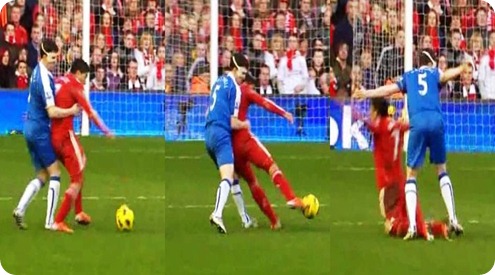 In the 69th minute, Caldwell was cautioned for ‘Unsporting Behaviour’ for yet another late challenge on Suárez. The ball was played up to Suárez, who exchanged a quick one-two with Maxi. As the Uruguayan knocked the ball past Caldwell and looked to drive into the penalty area, Caldwell cynically tripped Suárez to deny him a run on goal. The caution was issued for Caldwell, who “committed a foul for the tactical purpose of interfering with or breaking up a promising attack”.
In the 69th minute, Caldwell was cautioned for ‘Unsporting Behaviour’ for yet another late challenge on Suárez. The ball was played up to Suárez, who exchanged a quick one-two with Maxi. As the Uruguayan knocked the ball past Caldwell and looked to drive into the penalty area, Caldwell cynically tripped Suárez to deny him a run on goal. The caution was issued for Caldwell, who “committed a foul for the tactical purpose of interfering with or breaking up a promising attack”.
In the 75th minute, Lucas played a ball into Suárez, the Uruguayan striker turned Caldwell and looked to sprint into the penalty area. Both players were about two yards from the area and, as the picture shows, Caldwell made no attempt to play the ball; instead he grabs Suárez around the chest and, as Suárez moves goal side, pulls him to the ground.
Mr Friend was in perfect position and instantly awarded the free-kick yet somehow, and I cannot find any logical reason for this, he declined to caution Caldwell for ‘Unsporting Behaviour’ for the very specific offence of “holding an opponent for the tactical purpose of pulling the opponent away from the ball or preventing the opponent from getting to the ball”. The offence is almost made for this exact scenario, yet Mr Friend simply failed to fulfil his responsibilities as a referee.
Overall, I thought Mr Friend’s performance was significantly below the standard expected in the Premier League and he failed to discharge his responsibilities. His leniency and unwillingness to protect Suárez from what appeared a fairly cynical targeting contributed towards Wigan being able to secure a 1 – 1 draw.
West Ham (A) – Mark Halsey.
Mark Halsey is not a lucky omen for Liverpool, especially in away games. He last officiated for us in November 2010 in our game at Stoke, a game that took brutality in football to new levels. At Upton Park he faced a very different challenge, having to decide whether Demba Ba or Frédéric Piquionne had developed a sudden case of vertigo or were simply trying to win free-kicks or penalties for West Ham. The first and only caution was in the sixth minute for Martin Skrtel, who tripped Piquionne in an attempt to prevent the French striker breaking towards goal. Skrtel was cautioned for ‘Unsporting Behaviour’ not because of the severity of the foul, but because Mr Halsey deemed that the foul was ‘committed for the tactical purpose of interfering with or breaking up a promising attack’. This is often why a player seems to be allowed a number of minor fouls without being cautioned and then another player is cautioned for his first foul.
Liverpool had two penalty claims, the first for a handball by Piquionne, who controlled and cleared the ball in his own six-yard box. The ball clearly hit the player’s arm, but as with the claim against Lucas in the Chelsea match, Piquionne’s arm was by his side, he made no additional movement towards the ball and the claim was rightly waved away.
In the 35th minute, Liverpool had a legitimate penalty claim ignored by Mr Halsey after Suárez was fouled by James ‘not related’ Tomkins just inside the penalty area. Meireles collected the ball in midfield and chipped the ball to Suárez, who controlled it on his chest with his back to Tomkins and allowed the ball to bounce in front of him. As the Uruguayan waited to play the ball, Tomkins made a rash challenge from behind, having absolutely no way of playing the ball without fouling Suárez. As the picture shows, Tomkins kicks through Suárez’s left leg, makes no contact with the ball and upends Suárez for a clear free-kick.
The offence is just inside the penalty area and Mr Halsey was perfectly positioned to see the challenge, yet again, astonishingly, he failed to blow up and denied Liverpool a certain penalty. Why? I simply don’t know, nor can I fathom any reason why Mr Halsey failed to make a simple decision; he clearly saw the incident because he made a demonstrative gesture with his arms signalling no foul.
Mr Halsey had few difficult decisions to make thereafter, yet to give him credit he was consistent in ignoring both Ba and Piquionne when the two powerfully built West Ham strikers fell to the ground. Again I have to say that his performance was sub-standard, and he showed a final lack of judgement in exchanging a smiling handshake, which turned into a full hug, with Avram Grant on leaving the pitch. Was it harmless? Almost certainly, following Mr Halsey’s illness. But such shows of bonhomie may be ill-advised if they raise suspicions amongst opposing teams’ fans who feel that their team did not get the rub of the green within the match.
